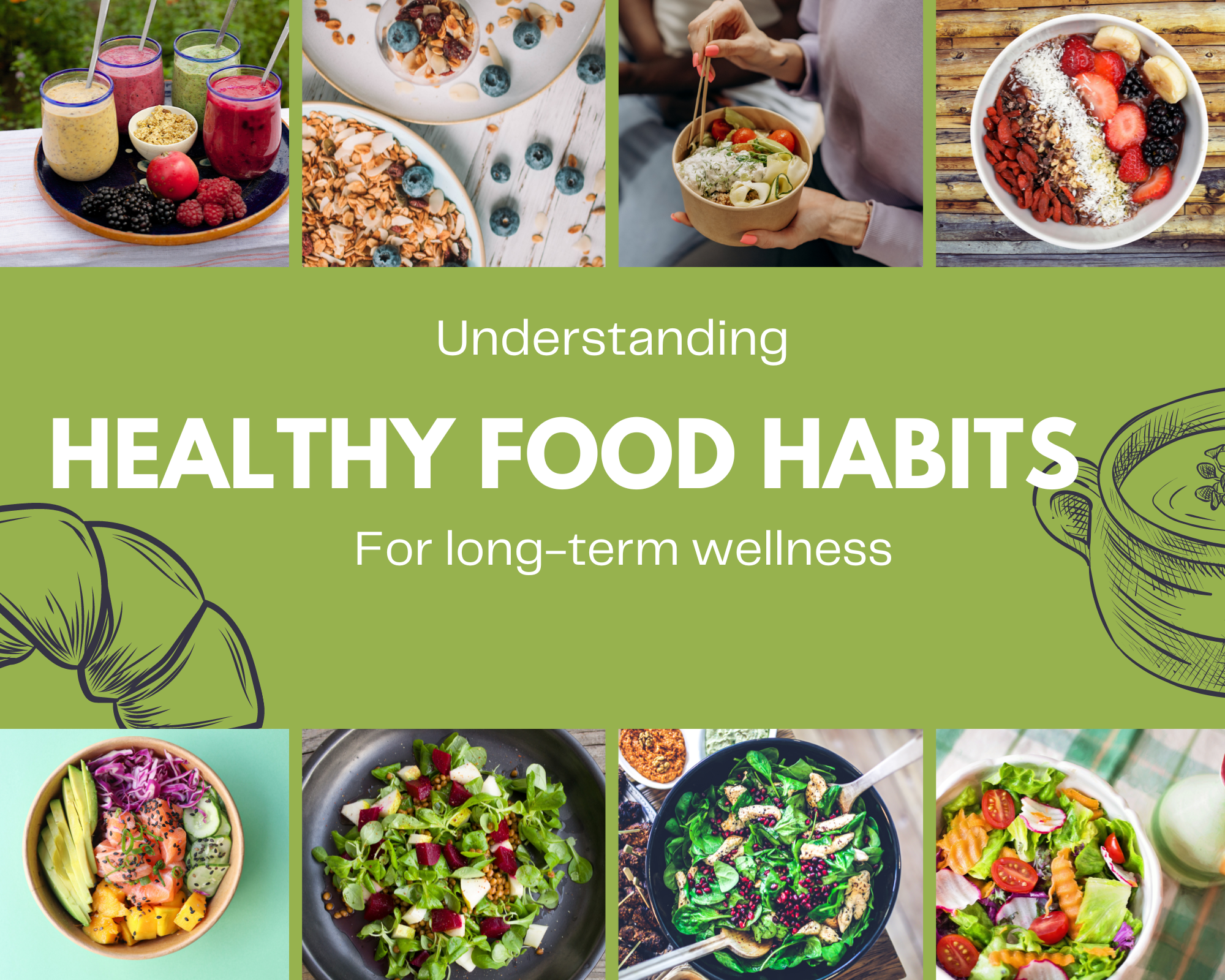In our journey towards better health and well-being, cultivating healthy food habits plays a pivotal role. Healthy eating isn’t just about short-term dietary changes; it’s about adopting a sustainable lifestyle that integrates nutritious foods into our daily routines.
What are Healthy Food Habits?
1. Balanced and Varied Diet: A healthy food habit involves consuming a diverse range of foods to ensure the intake of essential nutrients, vitamins, and minerals. Aim for a variety of colorful fruits, vegetables, whole grains, lean proteins, and healthy fats to meet your body’s nutritional needs.
2. Portion Control and Moderation: Maintaining portion control is key. Even healthy foods can contribute to weight gain if consumed excessively. Learning appropriate portion sizes and practicing moderation are vital for maintaining a healthy weight and preventing overeating.
3. Regular Meal Patterns: Establishing consistent meal times fosters a stable metabolism and prevents erratic eating behaviors. Aim for three balanced meals a day, incorporating healthy snacks if needed, to maintain energy levels and prevent excessive hunger leading to unhealthy food choices.
4. Mindful Eating Practices: Practicing mindfulness while eating involves being present and attentive during meals. This means savoring each bite, chewing slowly, and paying attention to hunger cues and satiety signals. It helps prevent overeating and encourages a deeper appreciation of food.
5. Hydration: A healthy food habit includes staying adequately hydrated by consuming water and other hydrating beverages throughout the day. Water aids digestion, supports metabolism, and helps regulate body temperature.
The Benefits of Healthy Food Habits
1. Weight Management: Adopting healthy food habits contributes significantly to weight management. It helps maintain a healthy weight by preventing excessive calorie intake and fostering better control over eating patterns.
2. Enhanced Nutritional Intake: Healthy eating habits ensure the intake of essential nutrients, promoting overall health, and immunity, and reducing the risk of chronic diseases such as heart disease, diabetes, and certain cancers.
3. Improved Energy Levels: A well-balanced diet provides sustained energy levels throughout the day. By avoiding energy crashes caused by processed or sugary foods, healthy eating habits keep you feeling more energized and alert.
4. Better Digestive Health: Fiber-rich foods and a diet rich in fruits and vegetables contribute to better digestive health. They aid in regular bowel movements, prevent constipation, and support a healthy gut microbiome.
5. Positive Impact on Mental Health: Healthy eating habits aren’t just beneficial for the body; they also have a positive impact on mental well-being. A balanced diet rich in nutrients supports brain health and can positively influence mood and cognitive function.
Tips for Cultivating Healthy Food Habits
1. Plan and Prepare Meals: Planning meals in advance helps make healthier choices and reduces the likelihood of impulsive, less nutritious options. Meal prepping ensures easy access to healthy foods throughout the week.
2. Read Food Labels: Being mindful of food labels helps in understanding nutritional content and making informed choices. Opt for foods with fewer additives, lower sugar content, and limited trans fats.
3. Incorporate Whole Foods: Whole foods such as fruits, vegetables, whole grains, lean proteins, and healthy fats should form the foundation of your diet. These nutrient-dense foods provide essential vitamins and minerals while minimizing processed ingredients.
4. Seek Professional Guidance: Consulting a registered dietitian or nutritionist can provide personalized advice tailored to individual health needs, ensuring a more effective and sustainable approach to healthy eating. You can ask Weight Planning, for personal guidance, we’ll guide you every day during your weight loss journey.
5. Enjoy Treats in Moderation: While focusing on healthy eating, it’s also important to allow yourself occasional treats. Moderation is key; enjoying your favorite indulgences in controlled portions can help maintain a balanced relationship with food.
Cultivating healthy food habits is a continuous process that involves making mindful choices, prioritizing nutrient-dense foods, and fostering a positive relationship with food. Incorporating these habits into your daily routine can lead to long-term health benefits, improved overall well-being, and a sustainable approach to maintaining a healthy weight and lifestyle.
At Weight Planning, we’re committed to guiding you on your journey towards better health. By adopting and nurturing healthy food habits, you’re taking a significant step towards achieving your wellness goals and embracing a fulfilling, balanced lifestyle.





Leave a Reply